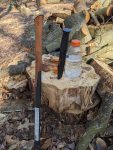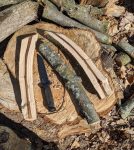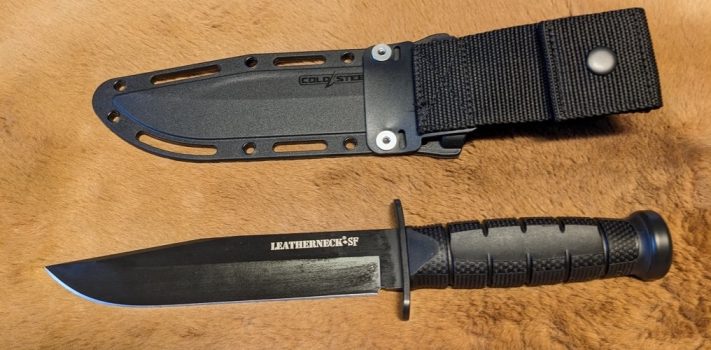Clearly inspired by the Marine “Knife, Fighting Utility” of World War II and beyond, the Cold Steel Leatherneck SF takes a classic concept and improves upon it. The German D2 steel blade of the Leatherneck is a significant upgrade from the 1095 carbon steel of the original, as is the Kray-Ex handle that replaces the stacked leather washers of the original.
During my testing I found the Leatherneck SF to be a sharp and durable knife that was especially useful in firewood processing, gardening, and yard care.
This knife leaves me torn, because there are two different places that I would like to keep it. I would like to store it in the pole barn for the above-mentioned tasks, and I would also like to stow it in our camper for use in camp chores like batoning firewood. I am afraid that if I move it back and forth, it will always be in the pole barn when I need it in the camper, and in the camper when I need it in the pole barn. I am tempted to buy a second knife, so that I can keep one in each place.
The only improvement to the design that I can suggest would be to add fullers on each side of the blade like the ones that lightened the blade of the original.
The Leatherneck SF was on sale for $91.99 at the time of this writing from www.coldsteel.com. If you are looking for a good field knife, this one qualifies.
First Impressions
 The “SF” in “Leatherneck SF” stands for “Semper Fi”, just in case the shape of the knife and the word “Leatherneck” are not enough to tip off the potential buyer that this knife is a tribute to the classic Marine “Knife, Fighting Utility.” The 6.75 inch, saber-ground, clip-point blade is just 1/4 inch shorter than the 7 inch blade of the original. The blade arrived shaving sharp.
The “SF” in “Leatherneck SF” stands for “Semper Fi”, just in case the shape of the knife and the word “Leatherneck” are not enough to tip off the potential buyer that this knife is a tribute to the classic Marine “Knife, Fighting Utility.” The 6.75 inch, saber-ground, clip-point blade is just 1/4 inch shorter than the 7 inch blade of the original. The blade arrived shaving sharp.
The blade is covered with a “non-reflective”, black, powder-coat finish. I found that finish to be slightly glossier than I would have preferred, but it was not bad.
The Leatherneck weighs 11.7 ounces, and the handle is 5 inches long. The handle provides an excellent grip surface, and the knife is nicely balanced. The sturdy metal pommel is flat, and can be used for hammering. A sturdy steel double cross-guard helps to prevent the hand from slipping down the handle and onto the blade.
As I mentioned above, the blade is made of German D2 steel. D2 is one of my favorite steels, combining excellent durability and edge retention, mild corrosion resistance, and a reasonable price point in comparison with many of the more exotic modern steels.
The ambidextrous Secure-Ex sheath is less bulky and quieter than the polymer sheaths of some other field knives such as the Glock FM81.
The warranty is fairly typical, covering defects in workmanship and materials. It explicitly does not cover normal wear and tear. This is reasonable, since the warranty does not misrepresent itself as a “lifetime warranty.”
The Leatherneck SF is made in Taiwan.
Like most field knives, the Leatherneck SF is just a little too large for truly comfortable belt carry. The length and bulk of the blade also make it slightly awkward for many camp tasks like cleaning game or food preparation. A field knife is a compromise. It has to be long enough to penetrate vital organs in combat, and short enough to be effective for the more mundane tasks of daily life in the field such as opening cans, cutting field telephone wire, or opening crates. The USMC found this style of knife to be an effective compromise for both types of tasks during World War 2 and beyond. I would not dream of arguing with their superior experience and wisdom in this matter.
A Rant, à la Kipling
The box also contains the warning, “Please use caution when handling Cold Steel products. Knives are extremely sharp.” I have often commented that the fact that so many companies find it necessary to make such statements results from a rottenness at the very core of our society that will lead to its eventual destruction. When you have to warn people that knives are sharp, that fire burns, that water is wet, and that uncontrolled spending must eventually be repaid, the day of reckoning is near at hand.
I am reminded of Rudyard Kipling’s 1919 poem, “The Gods of the Copybook Headings.” Although I take exception to his reference to “incarnations” and to mankind living in trees, I recognize the references to “Gods” as metaphorical, and honor Kipling’s superior insight that far eclipses the ersatz “wisdom” of our age:
As I pass through my incarnations in every age and race,
I make my proper prostrations to the Gods of the Market-Place.
Peering through reverent fingers I watch them flourish and fall,
And the Gods of the Copybook Headings, I notice, outlast them all.
We were living in trees when they met us. They showed us each in turn
That Water would certainly wet us, as Fire would certainly burn:
But we found them lacking in Uplift, Vision and Breadth of Mind,
So we left them to teach the Gorillas while we followed the March of Mankind.
We moved as the Spirit listed. They never altered their pace,
Being neither cloud nor wind-borne like the Gods of the Market Place,
But they always caught up with our progress, and presently word would come
That a tribe had been wiped off its icefield, or the lights had gone out in Rome.
With the Hopes that our World is built on they were utterly out of touch.
They denied that the Moon was Stilton; they denied she was even Dutch.
They denied that Wishes were Horses; they denied that a Pig had Wings.
So we worshipped the Gods of the Market Who promised these beautiful things.
When the Cambrian measures were forming, They promised perpetual peace.
They swore, if we gave them our weapons, that the wars of the tribes would cease.
But when we disarmed They sold us and delivered us bound to our foe,
And the Gods of the Copybook Headings said: “Stick to the Devil you know.”
On the first Feminian Sandstones we were promised the Fuller Life
(Which started by loving our neighbour and ended by loving his wife)
Till our women had no more children and the men lost reason and faith,
And the Gods of the Copybook Headings said: “The Wages of Sin is Death.”
In the Carboniferous Epoch we were promised abundance for all,
By robbing selected Peter to pay for collective Paul;
But, though we had plenty of money, there was nothing our money could buy,
And the Gods of the Copybook Headings said: “If you don’t work you die.”
Then the Gods of the Market tumbled, and their smooth-tongued wizards withdrew,
And the hearts of the meanest were humbled and began to believe it was true
That All is not Gold that Glitters, and Two and Two make Four—
And the Gods of the Copybook Headings limped up to explain it once more.
As it will be in the future, it was at the birth of Man—
There are only four things certain since Social Progress began:—
That the Dog returns to his Vomit and the Sow returns to her Mire,
And the burnt Fool’s bandaged finger goes wabbling back to the Fire;
And that after this is accomplished, and the brave new world begins
When all men are paid for existing and no man must pay for his sins,
As surely as Water will wet us, as surely as Fire will burn,
The Gods of the Copybook Headings with terror and slaughter return!
Testing
 I initially attached the Leatherneck SF to the belt of my work pants, and carried it with me during my various outdoor tasks. I quickly found it to be such a help in wood processing, that I started keeping it with my wood processing tools instead. It was especially effective at trimming away the little branches on rounds that I missed with the chainsaw. The sturdy blade and full tang emboldened me to test the knife with batoning wood as well. It was the most effective knife for that purpose that I have ever tested.
I initially attached the Leatherneck SF to the belt of my work pants, and carried it with me during my various outdoor tasks. I quickly found it to be such a help in wood processing, that I started keeping it with my wood processing tools instead. It was especially effective at trimming away the little branches on rounds that I missed with the chainsaw. The sturdy blade and full tang emboldened me to test the knife with batoning wood as well. It was the most effective knife for that purpose that I have ever tested.
 I also used it to chop up some sticks to the proper length for a rocket stove that I was testing. It worked well for chopping sticks up to .5 inches thick, but the chopping process sent many sticks spinning off into the underbrush. A bypass lopper proved to be a much more effective tool for that task. But if you don’t happen to have a bypass lopper handy, the Leatherman SF will do the job, especially if you don’t have too much underbrush in which to lose chopped sticks.
I also used it to chop up some sticks to the proper length for a rocket stove that I was testing. It worked well for chopping sticks up to .5 inches thick, but the chopping process sent many sticks spinning off into the underbrush. A bypass lopper proved to be a much more effective tool for that task. But if you don’t happen to have a bypass lopper handy, the Leatherman SF will do the job, especially if you don’t have too much underbrush in which to lose chopped sticks.
It was great for cutting and uprooting the Virginia Creeper that was threatening to take over the tree house we had built for our grandchildren.
 It was good for cutting fibrous plant matter from the tines of the rototiller after we were done turning up the garden for planting.
It was good for cutting fibrous plant matter from the tines of the rototiller after we were done turning up the garden for planting.
It was good for rooting up saplings that had begun to establish themselves in my wife’s perennial bed.
It was good for cutting rubber strips and ranger bands from inner tubes in order to secure a revolver behind a revetment of sandbags for remote test firing.
A truck carrying heavy equipment for the power company had driven a truck tire off the edge of my driveway, dislodging part of a culvert. I needed to dig down to the culvert to repair it. The Leatherneck did a great job of hacking away the roots that got in the way of my digging.
All in all, it is a great knife to grab for any dirty, unpleasant job that comes to hand. It is sharp, durable, and easy to grip, making it a handy companion for tasks around the yard, garden, and wood lot.
Conclusion
The Cold Steel Leatherneck SF field knife is a worthy tribute to the Marine “Knife, Fighting Utility” of World War 2 and beyond. The D2 steel blade of the Leatherneck SF offers better corrosion resistance, edge retention, and durability than the 1095 carbon steel of the original. The Kray-Ex handle is also not prone to swelling or decay like the leather washers of the original. This makes the Leatherneck SF a significant improvement over the original.
If you are looking for a field knife with design similarities to the Marine “Knife, Fighting Utility”, but with some distinct improvements, then the Cold Steel Leatherneck SF might be an excellent choice.
Disclaimer
Cold Steel was kind enough to provide me with a sample of their “Leatherneck SF” knife for testing and evaluation. I tried not to let their kindness interfere with my objectivity in this review, and believe that I have succeeded. I did not receive any other financial or other inducement to mention any vendor, product, or service in this article.










